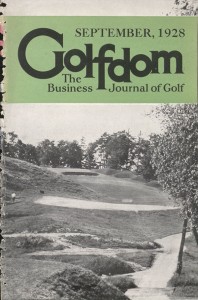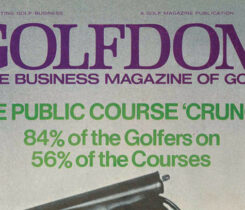The Golfdom Files: Fire him? No!
 Some things never change, no matter how many decades pass. ¶ In this new department, we look back to our archives to read what concerned superintendents 60, 70, 80 years ago. For this first installment we came across this story from the September, 1928 issue of Golfdom. “Fire him? No!” was written by Lawrence S. Dickinson from Massachusetts Agricultural College (now known as the University of Massachusetts Amherst) about the woes superintendents face. ¶ To see the original four-page story click here.
Some things never change, no matter how many decades pass. ¶ In this new department, we look back to our archives to read what concerned superintendents 60, 70, 80 years ago. For this first installment we came across this story from the September, 1928 issue of Golfdom. “Fire him? No!” was written by Lawrence S. Dickinson from Massachusetts Agricultural College (now known as the University of Massachusetts Amherst) about the woes superintendents face. ¶ To see the original four-page story click here.
Better appraise the kicks on the greenkeeper’s work
By Lawrence S. Dickinson // Massachusetts Agricultural College
I had just finished a good round of golf. It was a fine foursome, evenly matched, jolly, all “broke a hundred;” a good score for us. No one had lost any money, none had been bet, and only a reasonable number of balls were lost.
While resting a while on the veranda of the club house, a number of players went by me. During the 20 minutes I sat there I heard the phrase, “Get a new greenkeeper,” 12 times.
The greenkeeper seemed to me to be an able, honest, very hard working man of the type that makes greenkeeping a profession. The phrase, “Get a new greenkeeper,” worried me, for I knew he was a whole lot better than anyone we could get, even if we paid a much larger salary.
As the “crabs” came (by) I wrote their names on a pad. With the list of “crabs,” my knowledge of the club affairs, the greenkeeper and turf, as basic data I began to make a study of the situation.
Analyzes the kicks
The first name on the list was John A. Lawyer — big, husky chap, college football hero, past chairman of the Green Committee. John’s particular complaint that day was of the fairways. Grass was too long. Now I know that John drives a low ball, depending upon the roll for distance. John lost the match and thoughtlessly charged it to the greenkeeper because of the tall grass. The greenkeeper has only one tractor, that’s badly worn; five cutting units, two of them as reserve units. “Get a new Greenkeeper?” NO! Another tractor.
Unfair comparison
(Also) on the list was Thomas Playabout. Always comparing our course with Blank course. Tom lost his match because his driving had been off. “It’s the tees. I can’t get a good stance. At Blank course they have wonderful tees, their greenkeeper knows how to take care of them. Drove a lot better up there yesterday.”
The tees at the Blank course are all elevated and large. Our tees are the new style. Flat. Fire the greenkeeper on the strength of Tom’s argument? NO! There ought to be a $25 fine imposed upon all golfers who criticize one course when comparing it with another.
The Silent, Satisfied Majority
Nothing has been said about the 60 or 65 percent of the members who joined the club for its recreational and social advantages. If they lose a ball, a stroke or even a match game, it is “all in the game” and they lose no sleep, temper, or money over it. To these members the greenkeeper is most satisfactory. Unfortunately they remain silent.
The greenkeeper has to suffer for the lost bets, the bad days at the office, the present trend to make and maintain golf courses for a few low scorers. Such is “all in the game” for the greenkeeper.










